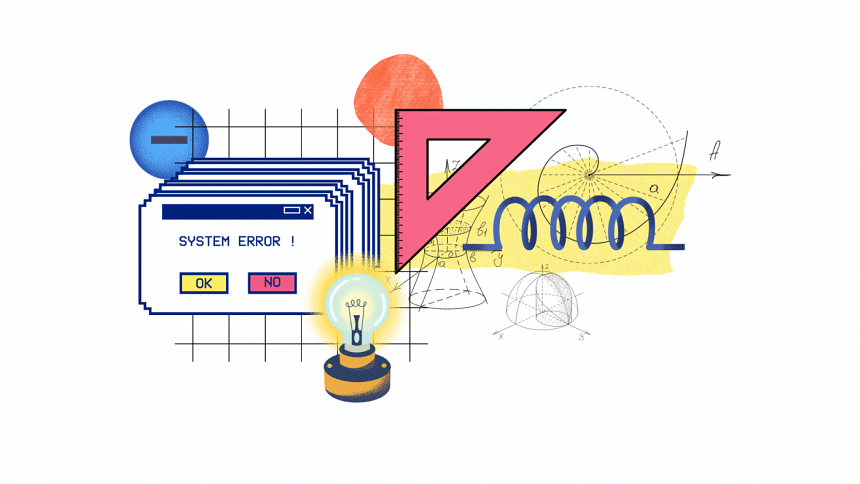Pursuing engineering: Here’s what students wish they knew before starting

While engineering is one of the most popular fields of study globally, it's not always sunshine and rainbows for students who dedicate their lives to it. If going into engineering is in your plans, you should begin to look into what to expect once you make the decision. After all, it's best to make an informed decision rather than jumping headfirst into a degree that might or might not be your cup of tea.
"I wish I knew maths," jokes Fahim Shahriar Saad, a final year Mechanical Engineering student from Ahsanullah University of Science and Technology (AUST). "Jokes aside, I really wish I knew how botched the job sector was in this country that I'd have to make plans to go abroad."
There are many types of engineering programmes, and someone with the sole target of becoming an engineer might not have thought too hard about exactly which discipline is for them. This is a rather basic mistake, because while the branches are interconnected, they are fundamentally different.
Mashrur Raiyaan, a student of Environmental, Water Resources, and Coastal Engineering at the Military Institute of Science and Technology (MIST), shares his thoughts regarding this.
"Before choosing your department, you should go through the HSC Science chapters that contain the basic principles on which your subject is based, and see if you have any interest in that branch," he says.
Shafat Ishrak Zaman, a student of Chemical Engineering at Bangladesh University of Engineering and Technology (BUET) is of a similar opinion.
"Before pursuing engineering, one has to know about the prerequisites of studying that subject. I feel that it's imperative to know about the core courses which one would need for the rest of their lives if they intend to be a chemical engineer," he says.
While this is unquestionably a good idea to get a grasp on what engineering has in store for you, it's far from the only factor you need to remember. Being good at the basics is a powerful tool in your arsenal, but it doesn't quite complete your inventory.
Fathin Yafee, currently studying Materials and Metallurgical Engineering at BUET, shares his experience.
"My interest in engineering was sparked by the ease I felt with HSC Physics, Chemistry, and Maths. Little did I know, the combination of good memory and practice will turn out to be more vital than comprehension," he says.
He is not alone in this opinion. Naoshin Anzum Islam, a third year Industrial and Production Engineering student at Islamic University of Technology (IUT), goes over the often-forgotten requirements for an engineer.
"I wish I knew that liking science or maths doesn't necessarily equate to enjoying engineering. Many students have the notion that engineering is the right choice for them if they are fast learners or have good problem-solving skills, but these are not the margin of adequacies," she says. "One should possess genuine interest in multifarious fields related to their major but a lot of us were unaware of the more important prerequisites for pursuing Engineering, like perseverance, sincerity, determination, and the ability to cope with difficulties."
Engineering, irrespective of the discipline, generally comes with a lot of hardships. It's notorious for being an academically challenging major, but that doesn't mean we aren't caught off guard when actually being academically challenged. Syeda Mostaquima Rab, a second-year student from Bangladesh University of Textiles (BUTEX), draws emphasis on this.
"Engineering is definitely not a place of comfort. Having to spend long lab hours standing, completing time consuming lab reports, and the never-ending sobbing before the day of an exam, that's engineering in a nutshell," she says.
Group projects and tight deadlines aren't unique to engineering, but teamwork plays a vital role in academic success here.
"Communication and teamwork are vital in this field. Not to mention, time management is crucial if you want to pursue engineering," says Ehsanul Ferdous, a student of Rajshahi University of Engineering and Technology (RUET), draws on his experience so far as an Electrical and Electronic Engineering (EEE) student.
Ashrarul Haque Sifat, a Computer Science and Engineering (CSE) student at Khulna University of Engineering and Technology (KUET), explains the difficulty that comes with actually implementing the knowledge gained, "Not only is the implementation of the knowledge difficult, but there are other things besides the strictly logical parts when it comes to engineering, so an overview of a subject is not enough to pursue it."
If you're a female student hoping to go into engineering, you may have heard things like "engineering is for boys" and have been advised to pursue a more theoretical field instead. While this often unsolicited advice is generally based on dated stereotypes, you may experience some prejudice once you go into the field.
"I wish I knew beforehand how male-dominated the field of engineering is," says Sumaiya Chowdhury*, who is currently in her third year of bachelors in EEE. "I only got to understand it once I experienced it firsthand."
However, it's important to not let the tales of overwhelming pressure and unexpected facts about engineering demotivate you if you feel that it's your calling. Abrar Chowdhury, a final year student of Software Engineering at IUT, speaks of how you can tackle the overwhelming pressure of engineering.
"We should have tailor-made mental health routines which would help us unwind, periodically assessing our situation and keeping us functional and in one piece," he says.
*Name has been changed for anonymity

 For all latest news, follow The Daily Star's Google News channel.
For all latest news, follow The Daily Star's Google News channel. 








Comments